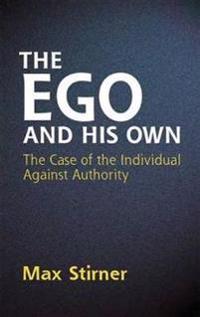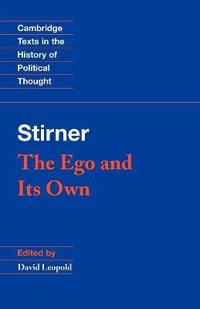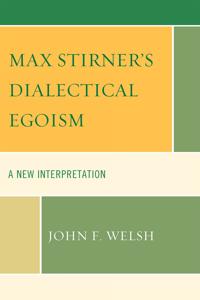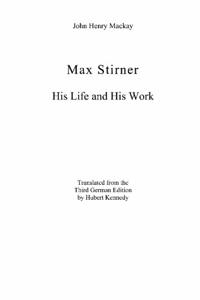Max Stirner (Inbunden)
avSaul Newman
ISBN: 9780230283350 - UTGIVEN: 2011-10Max Stirner was one of the most important and seminal thinkers of the mid-nineteenth century. In the shadows of Hegel, Stirner developed possibly the most radical and devastating critique ever of the discourses of modernity, incurring the ire of Marx, prefiguring Nietzsche, and having a major (thoug[...]
The Ego and His Own (Häftad)
avMax Stirner
ISBN: 9780486445816 - UTGIVEN: 200601Credited with influencing the philosophies of Nietzsche and Ayn Rand and the development of libertarianism and existentialism, this prophetic 1844 work challenges the very notion of a common good as the driving force of civilization. Max Stirner chronicles the battle of the individual against the co[...]
The Ego and Its Own (Häftad)
avMax Stirner
ISBN: 9780521456470 - UTGIVEN: 199504Max Stirnerâs The Ego and Its Own is striking and distinctive in both style and content. First published in 1844, Stirner's distinctive and powerful polemic sounded the death-knell of left Hegelianism, with its attack on Ludwig Feuerbach, Bruno and Edgar Bauer, Moses Hess and others. It also co[...]
Max Stirner's Dialectical Egoism (Pocket)
avJohn F. Welsh
ISBN: 9780739141564 - UTGIVEN: 2010-09Max Stirner (1806-1856) is recognized in the history of political thought because of his egoist classic The Ego and Its Own. Stirner was a student of Hegel, and a critic of the Young Hegelians and the emerging forms of socialist and communist thought in the 1840s. Max Stirner's Dialectical Egoism: A[...]
The Ego and His Own (Häftad)
avMax Stirner
ISBN: 9781481948395 - UTGIVEN: 2013-01"The Ego and His Own," the seminal defence of individualism, coloured the thinking of Friedrich Nietzsche, Max Ernst, Henrik Ibsen and Victor Serge, among many others, some of whom would vigorously deny any such influence in later years. Less reticent was Marcel Duchamp, who described Max Stirner as[...]
Max Stirner: His Life and His Work (Häftad)
avJohn Henry MacKay
ISBN: 9781594579837 - UTGIVEN: 2005-01Den eneste og hans ejendom (Häftad)
avMax Stirner
ISBN: 9788798635925 - UTGIVEN: 1999For sine udgivelser af Giambattista Vico Den nye Videnskab, Niccolò Machiavelli Fyrsten og Niccolò Machiavelli Drøftelser af Livius er Forlaget HELIKON blevet tildelt:
Det Italienske Udenrigsministeriums oversætterpris 2005.
Max Stirner (pseud. f. Johan[...]














